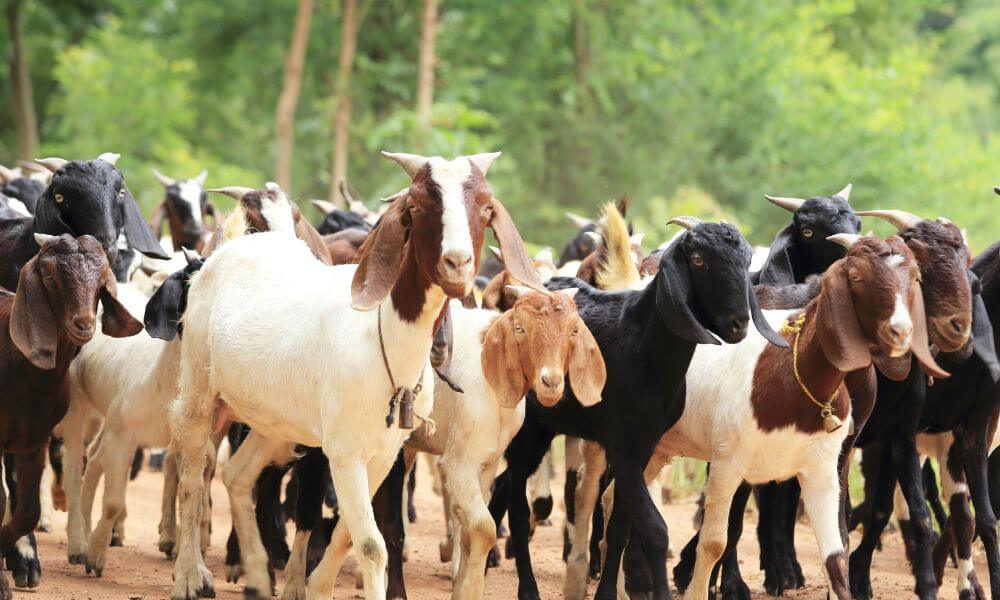It might sound like a strange question to those of you who have never heard it before, but it’s one that’s been asked more commonly than you might think.
It’s certainly interesting to wonder, but what exactly is this origin of this expression?
Where does it come from, and what does it mean?
Goats are and have been a symbol of bounty and wealth for many thousands of years.
Thus, they’ve always been an obvious gift in the case of a wedding.
The amount will vary, and it isn’t always a wedding gift specifically for the groom.
However, this is the most common case.
Let’s look further into this.

Why are goats given as a gift?
The simple answer is that goats are an incredibly useful piece of livestock.
Related Post: Are Goats Livestock? (Helpful Content With Photos!)
They provide great meat to feed you, milk to drink, and cheese to eat.
They also even provide good fiber for making clothes and other things.
Goats are one of humanity’s oldest relationships.
No farm animal shows earlier evidence of domestication.
They have been with us for a very long time, so we have come to fully appreciate their importance and value.
Thus, it makes sense for everyone to give and receive them as gifts.
It is a true sign of wealth and respect, and a fine gift.
In terms of why dowry gifts are given at weddings at all, that’s a complex question that I’ll answer in more detail shortly.
Essentially, though, you should see it as a question of archaic gender roles.
In a marriage, the man provides, and the woman maintains the home.
Obviously, these are dated and chauvinistic ideas.
But in the traditional view, this meant that the groom would need a gift for taking responsibility for the bride.
So, then—how many goats would a person be worth?
How do you know how many goats you are worth?
It would obviously depend on the situation, as in some of the grandest weddings, you can have very large and extravagant dowries.
In some medieval weddings, for example, the dowry would consist of an entire fleet of ships or something on that scale.
Humbler weddings may still use many dozens of goats as gifts for the groom.
Kings and emperors with animals to spare may find it politically expedient to lose this amount of wealth and resources in order to secure a political alliance.
In many modern traditions, though, goats are still given as wedding gifts even on small scales.
Among various tribes of Uganda, like the Bagisu and the Bakonzo, anywhere from four to twelve goats is considered a standard wedding gift.
So, you might be worth up to twelve goats, in the right circumstances!
We have been using the term dowry, but this phenomenon is also known as the bride price.
So, where does it come from?
Is it Biblical to pay the bride price?
No, the bride price or dowry does not have its origins in the Bible—although the bride price is indeed utilized in the stories and cultures of the Bible.
However, it is rather different in the case of the Bible. Often, all the bride price means is not a condition for marriage, but a penalty for rape.
If a man sleeps with a virgin to whom he is not pledged, he pays the bride price—and she must become his wife.
Dowries, of course, are still used in the Bible.
Often, they will be gifts of livestock or other similar things.
But this practice far predates the Bible, and clearly comes from elsewhere.
Today, dowries are often still a part of many practicing Christian denominations, but they are by no means exclusive to such cultures.
Why, then, should the girl’s family pay for the wedding—let alone give the groom a gift of goats?
Why does the girl’s family pay for the wedding?
There are fairly complex historical reasons for this.
If we are able to cast our minds back to a time, at least in western society, when women had no explicit political agency, then we have to understand the role of marriage.
Women were married to other families to bring the two families together.
The groom could then rule with his wife at his side, and produce heirs, which brought the influence of the bride’s family into the sphere.
But the bride herself was still considered a burden to the family.
Thus, the bride’s family, particularly the bride’s father, would be expected to pay a sometimes-hefty sum to the groom for the trouble that the bride would cause them.
This could just be a cash payment, but it could also be livestock like goats.
Obviously, this is an incredibly misogynistic and dated practice, implying women are a burden and little more. But this is the origin of the dowry practice.
So, while it might at first seem like a silly question, it’s actually one steeped in a huge amount of very interesting history.
Dowries were such an important political tool throughout the world for a very long time, and still are in many private family affairs.
Political marriages formed the backbone of inter-house alliances, and dowries were a large part of how that was secured.

Is there a deeper cultural or symbolic meaning behind the act of giving a goat as a gift, or is it simply a practical gesture in certain communities? Are there any specific occasions or circumstances where goats are preferred over other gifts?